The Mindfulness Practice that Transformed a Business
November 16, 2018 | Filed in: Woman of the Week
Before Alexis Pokorny became a sought-after mindfulness expert, she spent 12 years in corporate sales at international tech conglomerate Cisco. In her early twenties, she rose to the top 1 percent of the company’s performers, consistently delivering an average of 140 percent of her sales goals. Her secret sauce? A mindfulness practice, which she eventually taught to her team and then delivered into a company-wide program—with incredible results. A year ago, she left her position to found Open Deltas, a company that provides mindfulness consulting to businesses around the world. Here, she explains the psychology of mindfulness, the benefits of a compassionate workplace, and what she does when she feels like she’s about to lose her mind.
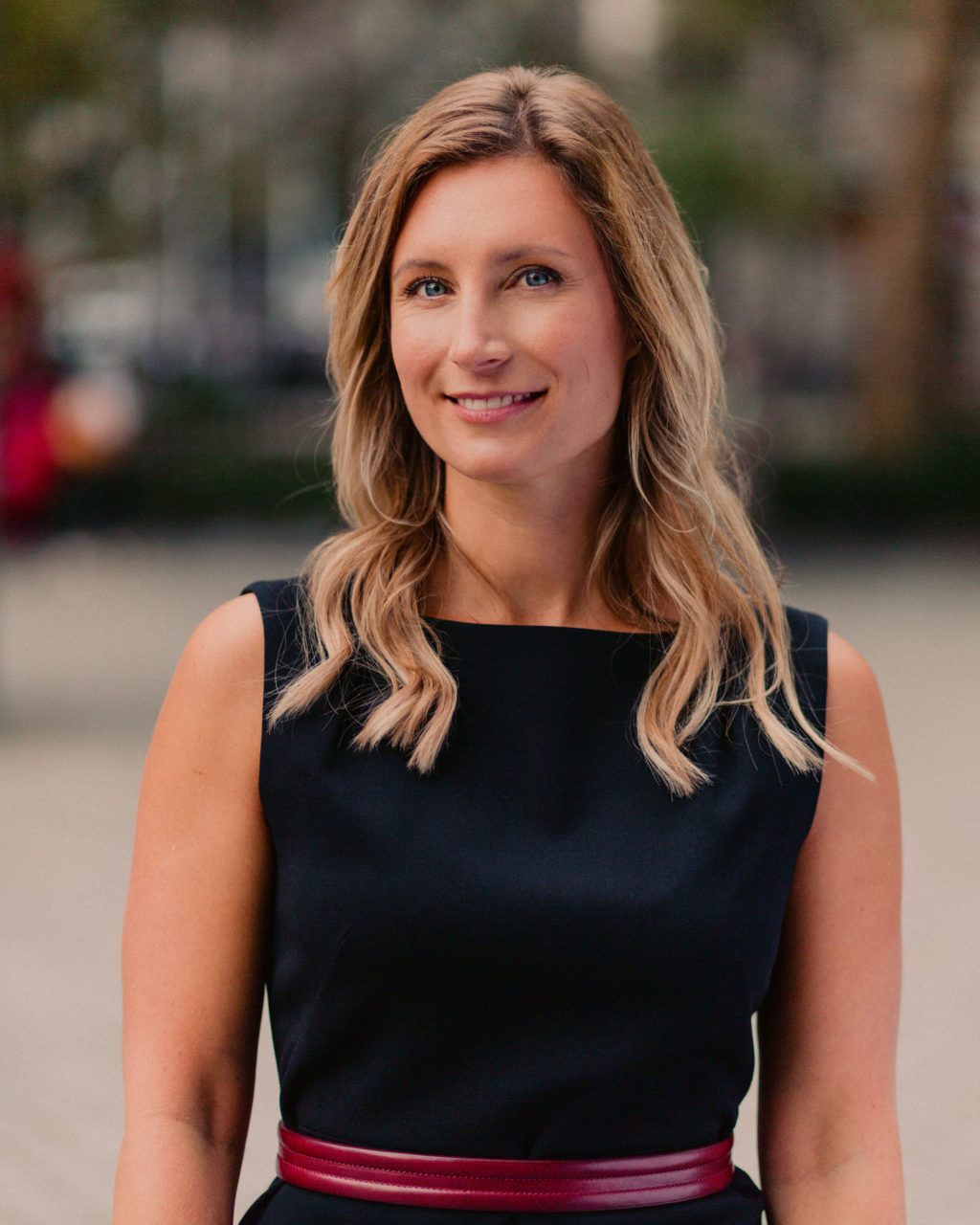
Alexis wears the Ryann dress and the Stitched Band belt.
BEFORE MY FIRST YEAR OF COLLEGE, my dad sat me down with a piece of paper and helped me map out my class schedule. We also looked at how many hours a week I needed to eat and sleep, what times I had to study and get things done, and when I could hang out with friends. Then he showed me how much my tuition was, so that I could see on paper that for every hour that I missed class or wasn’t getting a good grade, I was wasting X amount of money. It was this beautiful exercise that made me think, Wow! Getting drunk and being hungover doesn’t seem so appealing when you’re working this hard and spending this much money to get this education. I also paid my way through college, which required me to hold down three jobs and maintain a 4.0 GPA so that I wouldn’t lose my scholarships. It helped teach me the difference between working hard and working smart.
WORKING SMART ISN’T SO MUCH ABOUT TIME MANAGEMENT; it’s about energy management. How am I going to get the most bang for my buck, in terms of effort? I was careful to focus my energy on the right things one day at a time, and I think that’s what led me to have early career success.
BY 24, I HAD THE SAME ROLE AT CISCO as some people who had been in the industry for over a decade. This was during a recession, too, so I was making six figures while other people were struggling to get a job, including most of my friends. It was scary, and a little bit lonely. Knowing that I was one of the lucky ones made me careful, and kept me focused on pacing myself and not burning out. That’s when I started incorporating mindfulness into my day-to-day life.
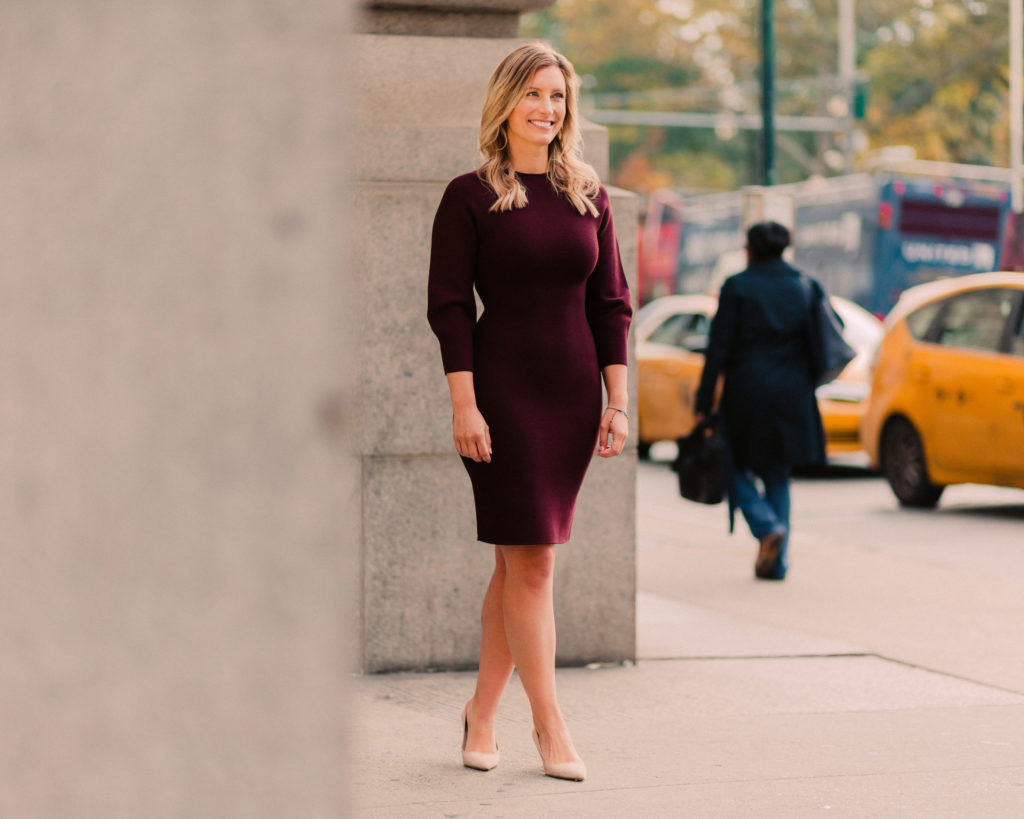
Alexis wears the Amanda dress.
MINDFULNESS IS JUST ABOUT BEING PRESENT IN THE MOMENT. It’s not about “doing”; it’s about “being,” and noticing it. We get so much information every day about what to do and how to do it that many of us have lost touch with our internal ability to discern what feels right and what doesn’t. When we’re stressed out, we can’t tell what matters. What I’m trying to teach people is that we can all be our own gurus—we just have to create space for that discernment.
I WAS HIRED TO TAKE OVER A BUSINESS TEAM AT CISCO that was experiencing some macro challenges. My employees weren’t making any money and were super stressed out. I figured I’d probably fail at turning things around, so I might as well do it my way. With our benefits team, we launched a mindfulness program and took the team through it. From there, we saw my team’s performance go from 67% to 94% of our goals, and our 80% attrition rate went to zero. People saw their marriages get better. Others went off their anxiety medication. Everyone realized that if we worked differently, we would be better at our jobs. It felt like we were selling way more than just datacenter products—there was a bigger picture. It was a really cool thing to be a part of.
CISCO TOOK NOTICE OF OUR IMPROVEMENT, and eventually, I became a video case study and was asked to present at our sales conference and then globally to 70,000 employees. It was exciting to make that happen, and see other people thriving because of it. But then, talking so much about mindfulness made my own intuition get stronger and louder. And my intuition said, “It’s time to leave what you’re doing and go out on your own.” It sounded a little crazy, given that I’d worked so hard to get to the level where I was. About a year ago, I decided to leave, and had no clue what the future held. Soon after, I was being asked to create programs at different companies and speak at conferences. Before I knew it, I had basically created my own dream company.

Alexis wears the Zora top, the Zhou culotte, and the Biltmore earrings.
THERE ARE A LOT OF MINDFULNESS EXPERTS OUT THERE, but I bring a unique and extensive personal experience in the corporate world. That’s why a lot of mindfulness training doesn’t resonate. You can’t go to a sales team and say, “Hey, we’re going to meditate for 10 minutes because it’s going to feel good.” When you’re trying to get results-oriented people on board, the key is to show the benefits and set proper expectations, and frame it as a tool for performance improvement.
I SPENT 12 YEARS BUILDING MY CAREER IN CORPORATE AMERICA. I led a team and lived in a nice apartment in New York City. Now I teach mindfulness and I live in a little village in Northern California. I’m not getting a stable paycheck auto-deposited every two weeks.Letting go of my big title and the life that went with it was a slap to the ego. But it’s also great. Every day I ask myself, “Does this feel right? Does that feel right?” And I listen. I’m not saying that people should quit their jobs to be happy. I just think they need to be more in touch with themselves every day.
I DON’T LET MYSELF GET INTO THAT STATE OF MIND where I wake up and frantically jump into all the things I have to do. Instead, I wake up every morning and take a few minutes for meditation. Then I go to the gym. After I come back, I do my formal 10-minute mindfulness practice, followed by my Daily Deltas, which I developed as part of my mindfulness program. Essentially, I only focus on three high-impact goals every day. I make that list after my mindfulness practice because that’s when I’m most at ease. Then I schedule those things into my calendar. Even if it’s something I don’t want to do—like expense reports—it’s blocked into my day so I won’t avoid it.
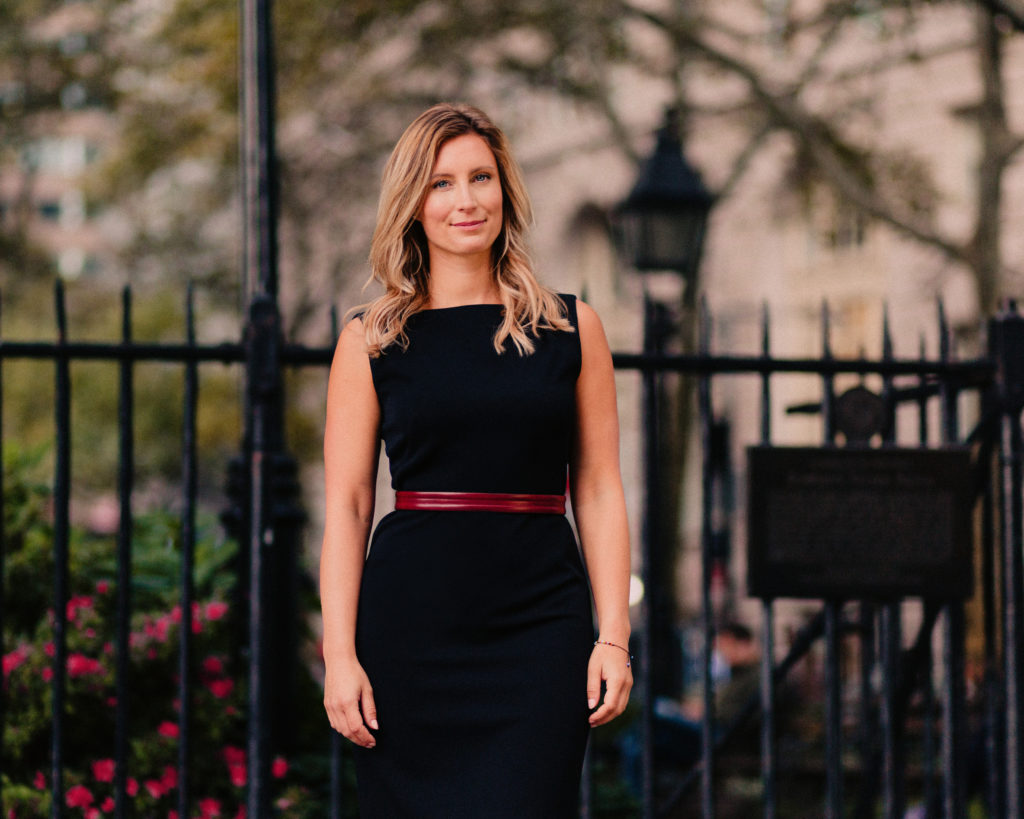
Alexis wears the Ryann dress and the Stitched Band belt.
OUR BRAINS ARE BASICALLY ADDICTED TO DOPAMINE, which is a chemical that makes you feel good. When you’re in a stressed-out state, you keep going from email to email, to text message and then back to email, and each new stimulus gives you a hit of dopamine. But it’s a vicious cycle—it doesn’t help you complete things, and it makes you frazzled. I’ve broken out of the habit of letting dopamine rule my day. Instead, I keep a running to-do list—I call it the bullshit list—of things that need to get done, but there’s no real urgency around them. I keep that list in a separate place, and then I’ll schedule out blocks of time when I work on it. For example, right now I have a lot of household chores because I’m in the process of moving. So there’s a lot of little menial things to do, and I’ll save them for a Friday afternoon. I’ll put on music and the diffuser and just spend a few hours on them.
IT’S NORMAL TO EXPERIENCE DISTRACTIONS—it’s essential for survival. Your brain wants to be scanning your environment to make sure you’re safe. But it stops being good when you can’t control it. You want to be able to notice those distractions, and then return to the present moment. Every time you do that, you’re strengthening the neural pathways that reinforce that action. For instance, when you’re meditating and focusing on your breath, distractions are going to come in. With mindfulness training, you learn to notice when your mind wanders and then come back to the breath. That cycle of noticing it and coming back, noticing it and coming back—that strengthens your brain, so that during the day, that action start becomes more natural in terms of how you respond to distractions that might otherwise be stressful.
WHEN PEOPLE TRY MEDITATION, it’s common for them to complain that it isn’t “working.” Instead, they usually say, “This is so hard,” and, “I’m not good at this.” And my feedback is always that there’s no winning and there’s no cheating. There is no end goal. I’ve been practicing for 15-plus years, and some days, I’m right on. Other times, I feel like I’m going to lose my shit. It’s the times when it’s really difficult that you’re doing your best work. Sure, your heart rate will go down after breathing for 10 minutes. But will that really improve your performance? Probably not after one day. It takes time and practice to strengthen those neurological muscles.
ANOTHER BIG PART OF MY PROGRAM IS COMPASSION. Part of that comes from listening. Say you work in sales: When you’re with your customer or your colleagues, you need to be 100% present with them, hearing what they say. The second part involves putting yourself in their place. What’s their life like outside of work? What are their goals and challenges? These mental exercises help people understand that what they do isn’t just about hitting a number. Through this lens, sales is actually a beautiful career in which you get to solve people’s problems and get paid for it. You start to look at every interaction with people as an opportunity to help them.
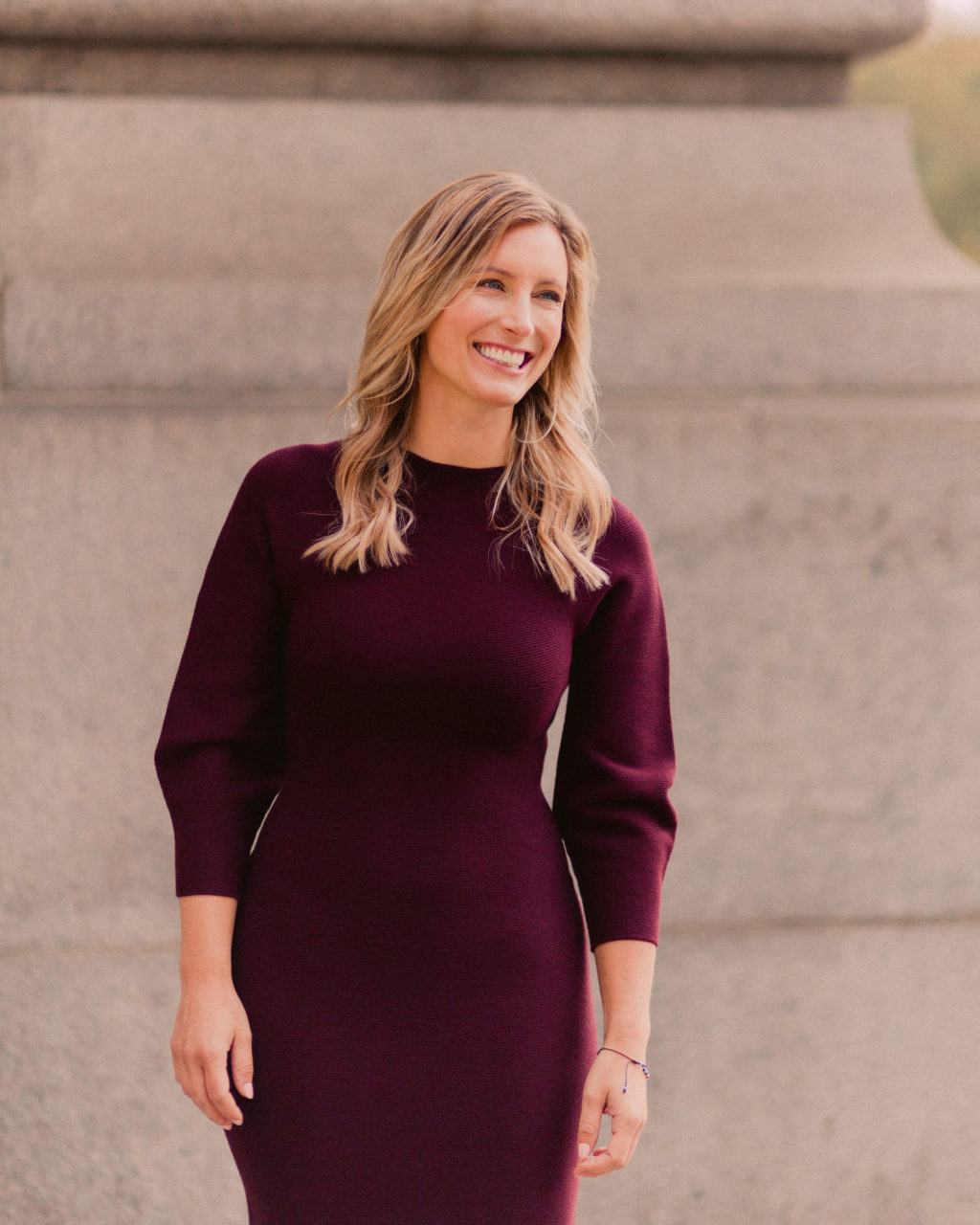
Alexis wears the Amanda dress.
FOR ME, BRINGING MORE COMPASSION to the workplace was also about releasing the judgment that being feminine was negative. There’s this assumption that if you’re kind and nurturing, you’ll be slotted into the role of girlfriend or mom. But the last time that I checked, we all want to work for people who support us, who are kind and nurturing, and who we trust. If that puts me into the category of “girlfriend” or “mom” with employees, then right on—my employees will work harder for me, and they will stay loyal. That being said, it’s important to still hold people accountable.
I THOUGHT THAT LEAVING MY CORPORATE ROLE would make my life less stressful, and that is not the case! No matter what situation you’re in, you can find a way to be stressed. I literally created my ideal life, with my ideal company and my ideal home in California, and there are still days when I’m like, “I’m going to lose it!” Yesterday, a guy came to install a light fixture and something broke and I was trying to get my LLC set up for my business and it all just felt like chaos. I want to master my response to stress so that I only feel it when it’s appropriate. There’s no reason to get stressed out when I come back from vacation to thousands of emails. But if a loved one is sick, that’s an appropriate time to be stressed. Or if someone seems threatening in a dark parking lot. In those cases, you can actively make a choice to lean on your stress response. Otherwise, it just burns you out.
I OFTEN SEE WOMEN EMBRACE this glorification of being “busy,” and it’s not until we end up with adrenal fatigue, get fired from a job, start having issues with our partners, or have some health catastrophe that we stop and re-evaluate. If you can establish a daily mindfulness practice, it allows you to figure out a pace that feels right instead of waiting until it’s too late.
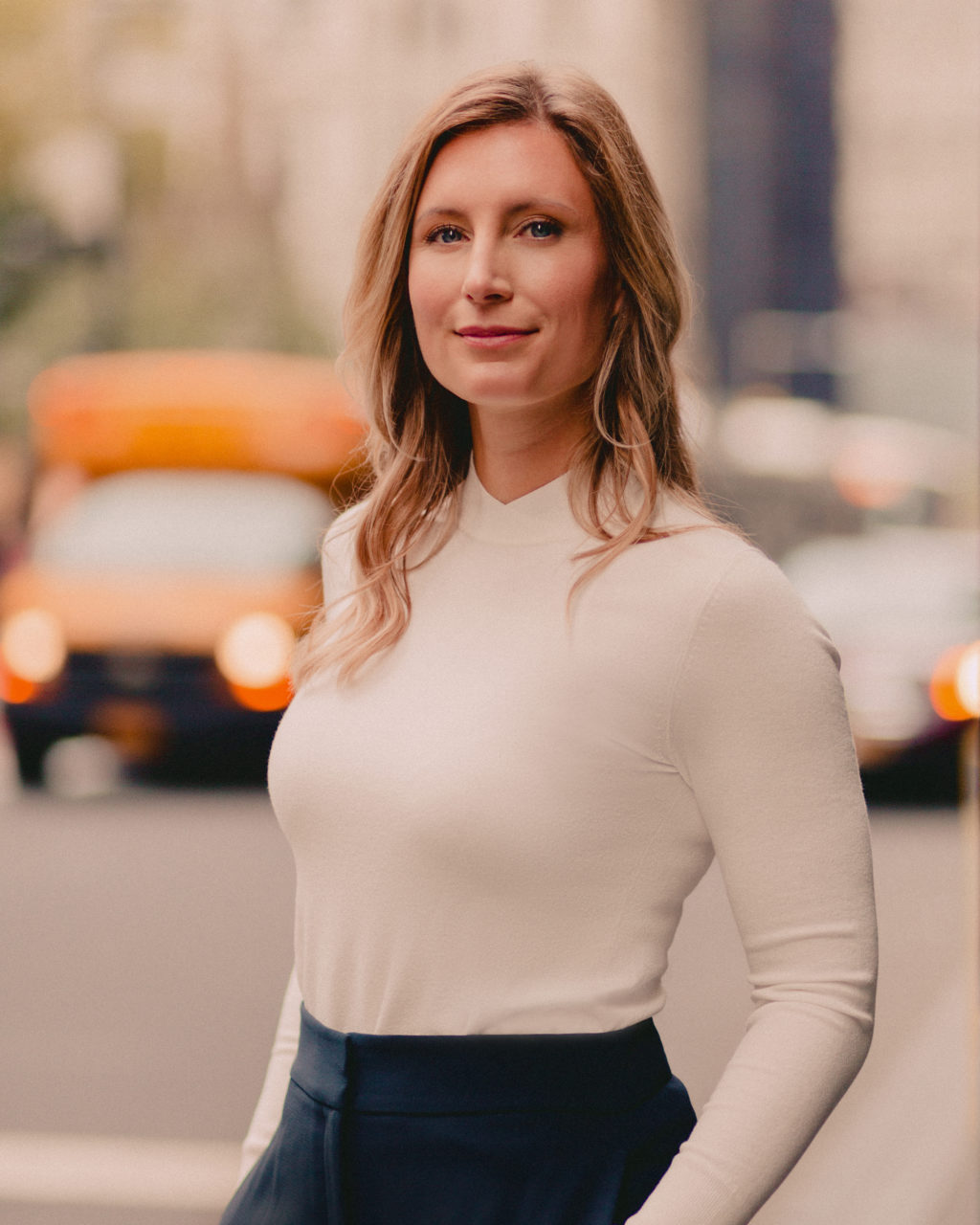
Alexis wears the Zora top, the Zhou culotte, and the Biltmore earrings.
Photographs by Bridget Badgore. Styling by Liz Young.





